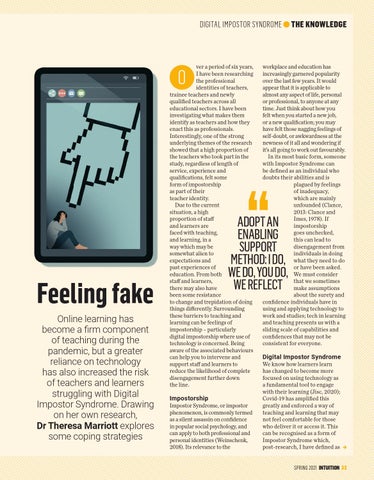DIGITAL IMPOSTOR SYNDROME
ver a period of six years, I have been researching the professional identities of teachers, trainee teachers and newly qualified teachers across all educational sectors. I have been investigating what makes them identify as teachers and how they enact this as professionals. Interestingly, one of the strong underlying themes of the research showed that a high proportion of the teachers who took part in the study, regardless of length of service, experience and qualifications, felt some form of impostorship as part of their teacher identity. Due to the current situation, a high proportion of staff and learners are faced with teaching, and learning, in a way which may be somewhat alien to expectations and past experiences of education. From both staff and learners, there may also have been some resistance to change and trepidation of doing things differently. Surrounding these barriers to teaching and learning can be feelings of impostorship – particularly digital impostorship where use of technology is concerned. Being aware of the associated behaviours can help you to intervene and support staff and learners to reduce the likelihood of complete disengagement further down the line.
O
Feeling fake Online learning has become a firm component of teaching during the pandemic, but a greater reliance on technology has also increased the risk of teachers and learners struggling with Digital Impostor Syndrome. Drawing on her own research, Dr Theresa Marriott explores some coping strategies
THE KNOWLEDGE
workplace and education has increasingly garnered popularity over the last few years. It would appear that it is applicable to almost any aspect of life, personal or professional, to anyone at any time. Just think about how you felt when you started a new job, or a new qualification; you may have felt those nagging feelings of self-doubt, or awkwardness at the newness of it all and wondering if it’s all going to work out favourably. In its most basic form, someone with Impostor Syndrome can be defined as an individual who doubts their abilities and is plagued by feelings of inadequacy, which are mainly unfounded (Clance, 2013: Clance and Imes, 1978). If impostorship goes unchecked, this can lead to disengagement from individuals in doing what they need to do or have been asked. We must consider that we sometimes make assumptions about the surety and confidence individuals have in using and applying technology to work and studies; tech in learning and teaching presents us with a sliding scale of capabilities and confidences that may not be consistent for everyone.
ADOPT AN ENABLING SUPPORT METHOD: I DO, WE DO, YOU DO, WE REFLECT
Impostorship Impostor Syndrome, or impostor phenomenon, is commonly termed as a silent assassin on confidence in popular social psychology, and can apply to both professional and personal identities (Weinschenk, 2018). Its relevance to the
Digital Impostor Syndrome We know how learners learn has changed to become more focused on using technology as a fundamental tool to engage with their learning (Jisc, 2020); Covid-19 has amplified this greatly and enforced a way of teaching and learning that may not feel comfortable for those who deliver it or access it. This can be recognised as a form of Impostor Syndrome which, post-research, I have defined as
SPRING 2021 INTUITION 33
33-35 The Knowledge - Marriott_Intuition March 2021_Intuition.indd 33
23/02/2021 08:47
